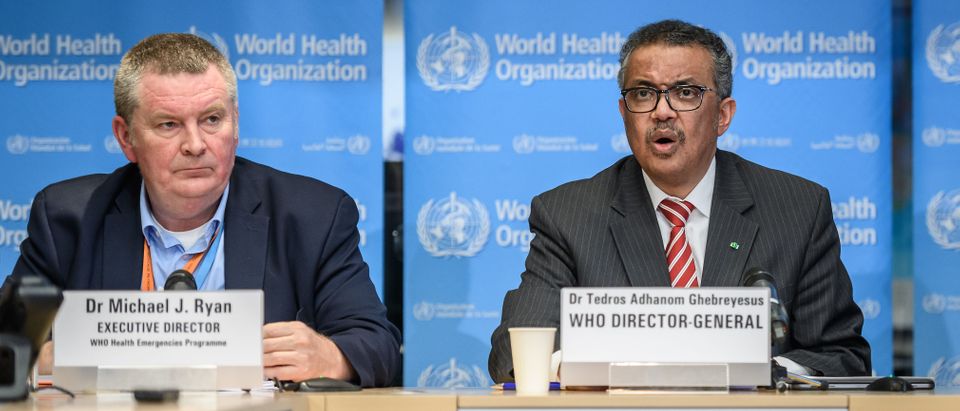Money talks.
On April 14, 2020 at his daily Rose Garden coronavirus briefing, President Trump announced that he was withholding U.S. contributions to the World Health Organization until there was an accounting for this U.N. agency’s actions during the coronavirus pandemic.
Predictably, Trump’s decision provoked an outpouring of WHO support consisting of arguments that withholding some $893 million in funding (over the next two years) in the midst of a global pandemic was a mistake. The president indicated that the money would be spent on other ways to combat the pandemic; it just wouldn’t go to the China-centric U.N. agency in Geneva, Switzerland.
The WHO’s coronavirus shortcomings have been catalogued elsewhere; there’s no need to repeat them here. What is perhaps less well-known, however, is the organization’s activities in places such as Syria, as detailed in an April 17, 2020, Washington Post column by Josh Rogin.
According to Rogin, the WHO has a “penchant for cozying up to dictatorships at the expense of public health.” Syria is yet another example of the WHO’s pattern of working “hand-in-glove with the most brutal regimes, praising their health programs while ignoring or even subsidizing their war crimes” (quoting David Adesnik, a senior fellow at the Foundation for Defense of Democracies).
Trump’s decision to withhold WHO funding reminded me of Ronald Reagan’s 1984 decision to withdraw the United States from UNESCO, the United Nations Education, Scientific, and Cultural Organization.
But wait. What could possibly have been wrong with UNESCO, the wonderful organization that identifies and supports cultural heritage sites around the world? Today, UNESCO seems to be working quite well, but at the time of Reagan’s decision, the agency was wasteful, corrupt, mismanaged and politically clueless. I happened to see UNESCO’s problems back then personally.
One of my first assignments in late 1979 as an associate attorney practicing public and private international law was work on behalf of a large, international advertising firm (still in existence) that was concerned about being targeted and maligned in a forthcoming UNESCO report on global advertising. UNESCO had established a commission to investigate global advertising, mostly in the wake of the late 1970s Nestle baby-formula scandal.
Heading that UNESCO commission was an Irishman named Sean MacBride, who was notable in two unusual respects. MacBride was the son of Maud Gonne, the mistress of poet William Butler Yeats, and he was the only person to have received both the Lenin and the Nobel peace prizes.
My assignment was to work with the two U.S. diplomats on the MacBride Commission to keep our client’s name out of the report, which I did. The MacBride Commission’s report appeared in 1980 and advocated an Orwellian-sounding “New World Information and Communications Order.”
UNESCO’s then director-general from 1974 to 1987 was a Senegalese educator named Amadou-Mahtar M’Bow. He became widely criticized for overseeing a politicized, demoralized bureaucracy that had also lost sight of UNESCO’s original purpose.
The U.S. quit UNESCO in 1984, and the U.K. followed suit the next year. M’Bow (who’s now 99 and living back home) was finally forced out in 1987. The U.S. did not return until 2003, a nearly 20-year absence.
As things turned out, I had a renewed UNESCO involvement 24 years later, in 2003, coinciding with our return to the organization. The new U.S. ambassador to UNESCO, Louise Oliver, was a friend and former colleague from the U.S. Department of Education, and the new UNESCO head of education policy was also a friend, former Vermont Lieutenant Governor and Congressman Peter Smith.
Then UNESCO director-general Koichiro Matsuura, an experienced Japanese diplomat selected to head the organization in 1999, was pursuing a major international “Education for All” initiative. At the time, I ran a D.C.-based think tank that shared similar education-policy interests. I met with Matsuura in both Paris and Washington, D.C., to discuss and pursue several ideas and opportunities for collaboration.
The point of this story should be obvious: Reagan’s withdrawal was a form of “tough love” that drove change at UNESCO. Perhaps we stayed out of UNESCO longer than we should have, but our decision to walk away then was the right thing to do.
We need international collaboration to fight today’s pandemic and future outbreaks, but we don’t need a politicized, ineffective, dictator-centric WHO to lead that effort. Reagan forced necessary UNESCO changes with his 1984 withdrawal, and I have every confidence that Trump’s WHO decision will produce similar changes and a much stronger WHO in the future.
Charles Kolb served as Deputy Assistant to the President for Domestic Policy from 1990-1992 in the George H.W. Bush White House


